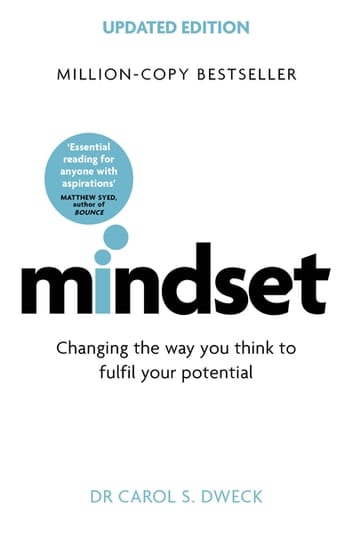This article explains how to develop a growth mindset based on the book Mindset by Carol Dweck, which introduces convincing concepts to change the way we think about success and fulfil our potential.
Dr Carol Dweck is an American Psychologist. She was on the faculty at Columbia University, Harvard University, and the University of Illinois before joining Stanford University. In Mindset: The New Psychology of Success, Dr Dweck explains that everyone juggles between two mindsets: a fixed mindset and a growth mindset. On the one hand, the fixed mindset sees intelligence and skills are a fixed product that we are either born or not born with. On the other hand, the growth mindset is believes that people can develop their abilities and talent.

We can approach our daily lives with a fixed or growth mindset. Let’s see a few key points of comparison. In a growth mindset, you:
- embrace challenges, instead of avoiding them
- persists in the face of difficulties, instead of being defensive or giving up
- see effort as the path to mastery, instead of something that makes you look weak
- learn from criticism, instead of ignoring or denying it
- find lessons and inspiration in the success of others, instead of feeling threatened or jealous
As a result, we may reach ever-higher levels of achievement instead of living with unfulfilled potential.
Adopting a growth mindset is therefore beneficial throughout our lives, as children, pupils, and students, but also as leaders, parents, and coaches. The book compiles short stories and lessons driven from scientific studies to empower its readership to adopt a growth mindset whenever possible.
Read Mindset by Carol Dweck
In Mindset, Carol Dweck explores the idea that our beliefs about our abilities and potential can greatly influence our success and happiness. Dweck provides examples of how fixed and growth mindsets play out in various aspects of life, from sports to business, and offers strategies for cultivating a growth mindset and achieving our full potential. This book strongly impacted my outlook on my professional and personal goals, I highly recommend it to anyone who loves learning!
What are the main lessons from the book?
These three lessons appeared to be the most impactful in my reading of Mindset:
1. Value effort, not outcome
First, praising intelligence or talent makes people be fearful in the face of challenges. This happens because praise often focuses on personality attributes, which are difficult to change. Instead, praising effort and hard work motivates the pursuit of further achievements without creating unnecessary pressure.
The next time you wish to show support and encouragement to your family or colleagues, tell them how proud you are of the hard work they put in. “It’s incredible how much you’ve learned!” stimulates a growth mindset, whilst “You are so smart!” encourages a fixed mindset.
2. Focus on learning, not proving your intelligence
Second, it’s frightening to give in on the idea of being inferior, but the growth mindset implies being a life-long learner at all levels. For this reason, we should seek situations where we challenge rather than comfort ourselves. We must look for opportunities to make mistakes, learn from others, and acknowledge our shortcomings.
“Why waste your time proving over and over how great you are, when you could be getting better?” asks Dr Dweck in the book. Similarly, you may have heard that “if you are the smartest person in the room, you are in the wrong room”. This is the takeaway from this lesson: the energy you spend on showing off is energy that could have been spent on learning.
3. Surround yourself with people who disagree with you
By being surrounded by people who constantly praise us, we learn nothing. The growth mindset implies a love of learning. Similarly, it implies seeking to be surrounded by people who will disagree with you and challenge you. This is particularly relevant given the ways in which social media and other digital spaces lead us to see and hear content that we already agree with. It’s important to brake those “bubbles” or “echo-chambers” and seek to socialise with people who think and behave differently from us.
“Next time you’re tempted to surround yourself with worshipers, go to church. In the rest of your life, seek constructive criticism” says Carol Dweck in Mindset.

The 5 best books for personal growth
There is no better way of starting a new journey than by reading a book that can change your perspective forever. I have selected the five best books for personal growth. They will provide plenty of inspiration, fascinating science facts, and mind-blowing tricks on your journey to happiness and success.

Hi! I’m Sophie
I am a social scientist and world explorer. In my work, I analyse the evolving meaning of security. I enjoy traveling, yoga, and electronic music in my free time. I consider myself an enthusiastic feminist and self-care advocate.




